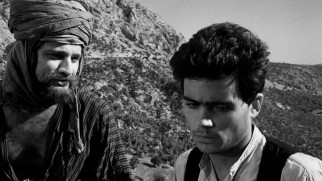America America DVD Review
 |
America America
Theatrical Release: December 15, 1963 / Running Time: 168 Minutes / Rating: Not Rated Writer/Director: Elia Kazan Cast: Stathis Giallelis (Stavros Topouzoglou), Frank Wolff (Vartan Damadian), Harry Davis (Isaac Topouzoglou), Elena Karam (Vasso Topouzoglou), Estelle Hemsley (Grandmother Topouzoglou), Gregory Rozakis (Hohanness Gardashian), Lou Antonio (Abdul Osman), Salem Ludwig (Odysseus Topouzoglou), John Marley (Garabet), Joanna Frank (Vartuhi), Paul Mann (Aleko Sinnikoglou), Linda Marsh (Thomna Sinnikoglou), Robert H. Harris (Aratoon Kebabian), Katharine Balfour (Sophia Kebabian), Elia Kazan (Narrator - uncredited) |
Buy America America on DVD from Amazon.com
Elia Kazan may have lost the respect of some of his peers when he gave the names of suspected communists to the House Un-American Activities Committee in 1952. What he did not lose was his career as one Hollywood's most accomplished film directors. Before his "friendly witness" testimony, Kazan had already won an Academy Award for 1947's Best Picture Gentleman's Agreement Post-HUAC, Kazan continued to work steadily, partnering with some of the most iconic actors of the time. He reteamed with Streetcar's Marlon Brando for On the Waterfront (1954), which won eight Oscars including Kazan's second Best Picture and Best Director honors. Next came the screen debut of James Dean in East of Eden. A few years later, Kazan introduced Warren Beatty and reintroduced Natalie Wood to the world of cinema on Splendor in the Grass (1961).
After that film, Kazan slowed down, directing his final four films over the next fifteen years. Starting him off on that final lap of his career was 1963's America America. Kazan's first screenplay credit, America was created in tandem with a novel, his second published. It is an epic film, but a highly personal one at that. As he states in his opening narration, Kazan was a Greek by blood, a Turk by birth, and an American because his uncle made a journey. All three of those affiliations figure here, with the last one comprising the thrust of the storyline.
We open in patriarchal Anatolian Turkey near the end of the 19th century, where we're told and shown oppression is rampant towards Greeks and Armenians. At first glance, it seems as though our protagonist is burly Armenian ice hacker/vendor Vartan (Frank Wolff). In fact, the young man who appears to be his sidekick is our star. His name is Stavros Topouzoglou (Stathis Giallelis) and he wants nothing more than to leave Turkey behind and start anew in America. His large family, however, is poor and traditional. Stavros' father (Harry Davis) reluctantly gives his blessing to such a trip, but Stavros is left to his own resources to come up with the 110 Turkish pounds needed to get a third-class ticket overseas.
Entrusted with his family's every possession of worth, Stavros heads to Constantinople and plans to take things from there. The trip to the capital city is perilous from the start, as young Stavros is swindled by a raft operator. The man coming to Stavros' aid is the first of several meaningful new acquaintances. Seemingly friendly and compassionate, Osman (Lou Antonio) winds up taking Stavros for almost everything he has. That's just the kind of journey it is. Stavros works hard at multiple back-breaking jobs, barely eats, scrapes up seven pounds over nine months, and has them stolen by a prostitute.
Still as determined as ever to get to America, Stavros entertains his cousin's idea of cleaning himself up and accepting the hand of one of a wealthy businessman's daughters. Stavros had previously rejected such a proposal, but experience has shown him that hard labor alone won't raise the necessary funds anytime soon. Alas, his innate decency justifies his first instinct, and guilt drives him away from his committed, acommodating would-be fiancιe (Linda Marsh). Stavros' final and seemingly most promising hope appears to be a middle-aged American woman (Katharine Balfour) who is regretting the early adulthood she missed out on by getting married young.
Truth be told, I knew very little about America America when I checked off its box to request a review copy. I saw Kazan's name and the production year, and welcomed the opportunity to see and write about something that wasn't playing in theaters just a few months ago. Unless you are a Greek-American and interested in your ancestors, a plot description of this is likely to turn you off. Don't let it; this is a rich, heartfelt, absorbing drama that speaks to the humanity in all of us, whether or not you can relate to wanderlust. Kazan's film doesn't boast a single face that was familiar to me. I'm no Robert Obsorne, but I have enough appreciation for cinema's past to recognize a few cast members in almost any older movie worth seeing. Here, Kazan's is the only big name and that is enough.
Just twenty-two during filming, Stathis Giallelis is a real Greek making his English language debut. His sharp features make him look like a unibrowed James Dean, and his acting career didn't last that much longer. Still, appearing in nearly every scene of America, he has a strong presence and command, which endears us to him even when his character is behaving selfishly or irresponsibly.
America America details the lengths that some people went to in order to emigrate towards what they hoped was freedom and opportunity. It's something that's easy to forget if your lineage begins even just a few generations back. For Kazan, who moved to the States at age four, there was little danger of ignoring where he came from and that tremendously shapes and elevates the film, which stands as a potent reminder of past struggles that paved the way for present comforts.
Though nominated for Best Picture, Best Director, and Best Original Screenplay, America America won only the Best Art Direction-Set Decoration honor at the 36th Academy Awards, losing to Tom Jones, its director Tony Richardson, and James R. Webb's How the West Was Won script. Though I abandoned charting my progress in articles, I'm still in the process of watching every Best Picture winner in chronological order and currently closing out the 1960s. I've got to admit that for me Tom Jones ranks a distant last in its decade and among the five worst winners I've seen since beginning the project. While America doesn't have that Best Picture feel to it, I think it'd have been a more deserving winner, as others surely would have been as well. Interestingly but not that unusually, two of 1963's best-known and highest-regarded films -- The Great Escape and Federico Fellini's 8½ -- didn't compete for Best Picture.
America America made its long-awaited DVD debut in last November's The Elia Kazan Collection, a Martin Scorsese-championed 18-disc, 15-movie set released by Fox with contributions from Sony and Warner. America hails from the lattermost studio, which makes it available on its own this week for the very first time in Region 1.
VIDEO and AUDIO Though Wikipedia claims it was shot in 1.66:1, Warner's DVD presents America America in 1.78:1 anamorphic widescreen. Picture quality is quite good on this black and white film. There are a few stock footage shots that show scratches, but the original content is largely free of imperfections and anomalies. The Dolby 1.0 monaural soundtrack shows some signs of age and of sloppy looping. Still, the dialogue remains intelligible and fairly clear throughout, overpowering ambience and mild intrusions like hiss with minimal distortion. English SDH and French subtitles are kindly offered.
BONUS FEATURES, MENUS and PACKAGING The film is joined by just one extra: an audio commentary by film historian Foster Hirsch, who calls himself America America's number one champion and certainly lives up to that title. Hirsch is full of information about Kazan, star Stathis Giallelis, and supporting actors. When he's not authoritatively sharing facts, he lends his observational and analytical talents to everything from subtext and character dynamics to Kazan's techniques and the details of his uncle's story. He even manages to keep dead air to a minimum, While clearly Warner has given up on the text extras they once used to love, it's disappointing that additional supplements couldn't have been included in the form of a Stathis Giallelis interview or at the very least the original theatrical trailer they should have somewhere in the archives. The exclusions are more glaring with this isolated from the Kazan Collection. The menus are static and silent. The keepcase, ecologically cut and void of inserts. In 2011, it's simply a treat to see a catalog title released, so it's not hard to overlook the common lack of frills here.
CLOSING THOUGHTS America America ranks among the most obscure Best Picture Academy Award nominees of the second half of last century. And yet, most of those who know it seem to hold it in high regard. I feel privileged to be able to join them. Kazan's personal immigration drama retains timeless and universal human appeal. Warner's long overdue DVD release, presumably identical to its appearance in the recent Kazan box set, provides a solid feature presentation and a nice commentary. More on the DVD / Buy from Amazon.com
|
Watch a scene from America America:
Related Reviews:
DVDizzy.com | DVD and Blu-ray Reviews | New and Upcoming DVD & Blu-ray Schedule | Upcoming Cover Art | Search This Site
1960s Best Picture Nominees: Doctor Zhivago The Sound of Music The Graduate The Apartment Mary Poppins
New: Broadcast News (Criterion Collection) Paranormal Activity 2 You Again Welcome to the Rileys Animal Kingdom
The Godfather Part II The Films of Rita Hayworth Into the Wild Hand in Hand Greek: Chapter Four







